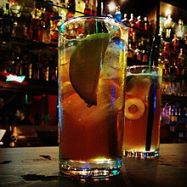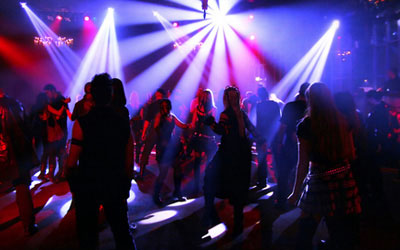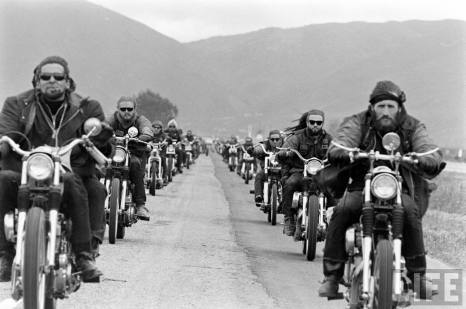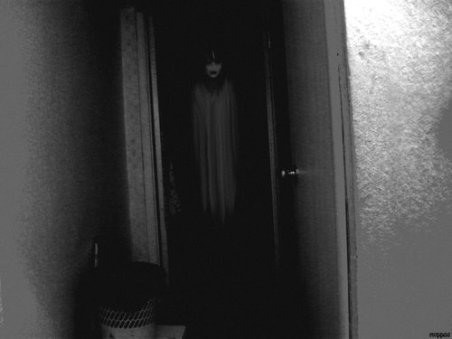There’d been a wedding that night—a couple from a nearby town smaller than Storm Lake (my hometown in Iowa)—and afterwards the groomsmen made their way to Malarky’s, the local nightclub just north of the lake across from the Tyson packing plant. Malarky’s was a family restaurant by day, club by night, and housed in an otherwise inconspicuous building save for the sign with the four-leaf clover and the fact that it meant an escape for hundreds of youth in the northwest pocket of Iowa. It was the only nightclub for several zip codes and every weekend kids from surrounding towns drove miles through the cornfields to drink toxic-colored cocktails, dance, and hopefully hook up.
It was one of two places in town that stayed open until 2 A.M. and every weekend the cops shook with unreleased tension, hoping for some out-of-the-ordinary action—a reprieve from leading funeral parades and handing out barely-above-speed-limit speeding tickets. They camped out in the parking lot, arms crossed, memorizing shady faces and predicting whose fights they’d soon be breaking up.
And there was always, without exception, a fight.
Clubbing at Malarky’s was a rite of passage in Storm Lake, and if you were a local college student this included a ride on the ‘drunk bus.’ This converted purple school bus may’ve been the butt of its own joke, but it was no joke to be stopped for public intox if you chose to walk instead. (Read: Bored police force.)
Now, I was a late bloomer in terms of rebellion and it took me until the age of 24 to grace the dance floor of this establishment. I didn’t drink until I was 21, and still had never really been drunk, so on that humid late-June night my hometown best friend took it upon herself to introduce me to this surpassed youth experience.
We started at my apartment with a couple of Smirnoff wine coolers, donning borrowed heels and puckering our lips at our reflections as we dabbed on another coat of red lipstick—one layer per drink consumed. This was a new facet of womanhood, I thought, another rite of passage in itself, dressing up in costume to appear bolder, looser, and more seductive. I wasn’t quite sure what to expect, but I was ready to take on the night.
Enter: two teetering girls on the brink of a renewed energy for life. My friend had been a mom for some time and this was one of her rare nights to blow off steam. I’d been struggling to find work and a way out of town, and in the meantime I was in desperate need for some fun and was ready to say yes to about anything, starting with the first pool-blue cocktail that my friend set in front of me. It was strong, sweet, and made me cringe, but it got me on the dance floor amidst the crowd of former classmates, teens, and coatless groomsmen.
Preferred music be damned, this was not the place to be picky. We danced to Top 40 hits and terrible hip-hop. We danced near and chatted up the groomsmen—a dull, paunchy lot, but our pickings were slim and when else would we get the okay from our husbands to flirt? I cheered the absentee newlyweds, envisioning the ceremony, the bride’s dress and the flowers with such clarity that I began to feel as though I’d been a part of the celebration. Wasn’t life beautiful! There was so much to be grateful for, so much beauty and kindness and love! Hope existed and people were inherently good! Everybody was exquisite, but especially (to my friend’s embarrassment) the boys whose ages I’d hate to guess and whose faces I stroked as I wobbled to the bathroom, their expressions sending signals I was too soused to accurately read.
 Whatever else I drank that night, I know there was a Long Island Iced Tea and a Jell-O shot that may or may not have made it to my mouth, its whipped cream cap dabbed on my nose like a miniature snow peak. In the bathroom we took selfies and pouted our blurry lips, knocking into other girls on our way out—a mild rough-and-tumble only permitted in the throes of inebriation.
Whatever else I drank that night, I know there was a Long Island Iced Tea and a Jell-O shot that may or may not have made it to my mouth, its whipped cream cap dabbed on my nose like a miniature snow peak. In the bathroom we took selfies and pouted our blurry lips, knocking into other girls on our way out—a mild rough-and-tumble only permitted in the throes of inebriation.
My friend led me by the hand to get some air on the patio where a fight was just breaking out. The cops moved in, frowning with delight, tensions high, and in that moment—a moment recounted to me the next day when I returned my friend’s shoes and asked if she’d found my ID and earring—she took me by the waist and kissed me as though it were a stage performance. It was soft, it was intentional, but clouded and mostly forgotten. If I’d been fully cognizant at the time I’m sure that one Katy Perry song would’ve come to mind (“the taste of her cherry chap stick”). This was a woman I’d loved for nearly 15 years, so in retrospect, it was probably about time we’d kissed. And hopefully, at the very least, we added to the fight-scene entertainment.
Just before closing we made our exit, followed by one of the groomsmen who tried to join us for a ride but was snubbed by the locking of doors and a sardonic wave as we weaved carefully out into the pre-dawn silence of our town that I was aching with a need to leave now more than ever.
That night was a sample, a taste of an endless series of new experiences I wanted to explore. It was a balancing point between youth and adulthood, the old me and the new, and it is solidified in my memory as a time that I finally let go of my insecurities and danced loose the shyness and awkwardness I’d been holding on to for far too long.






